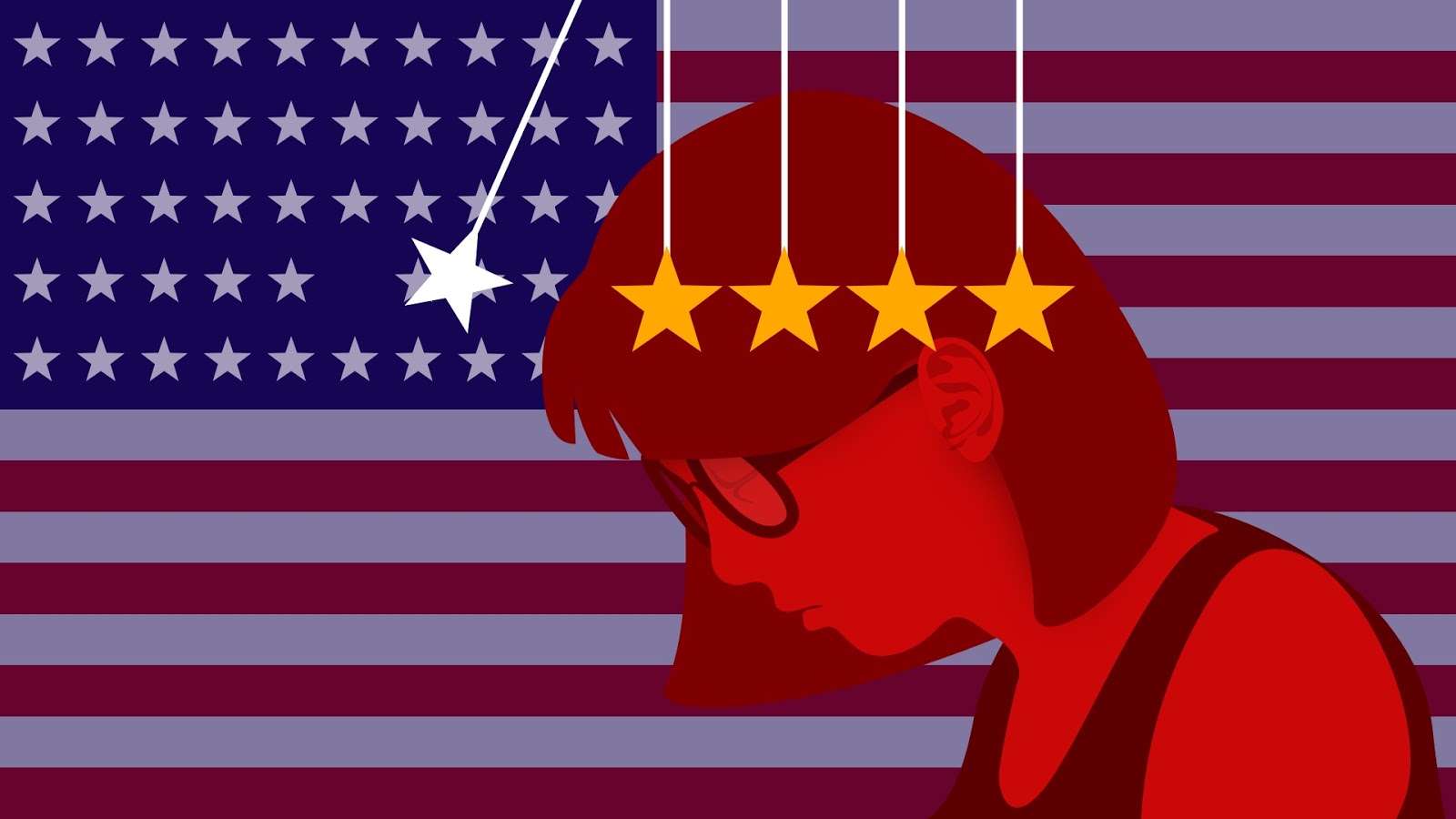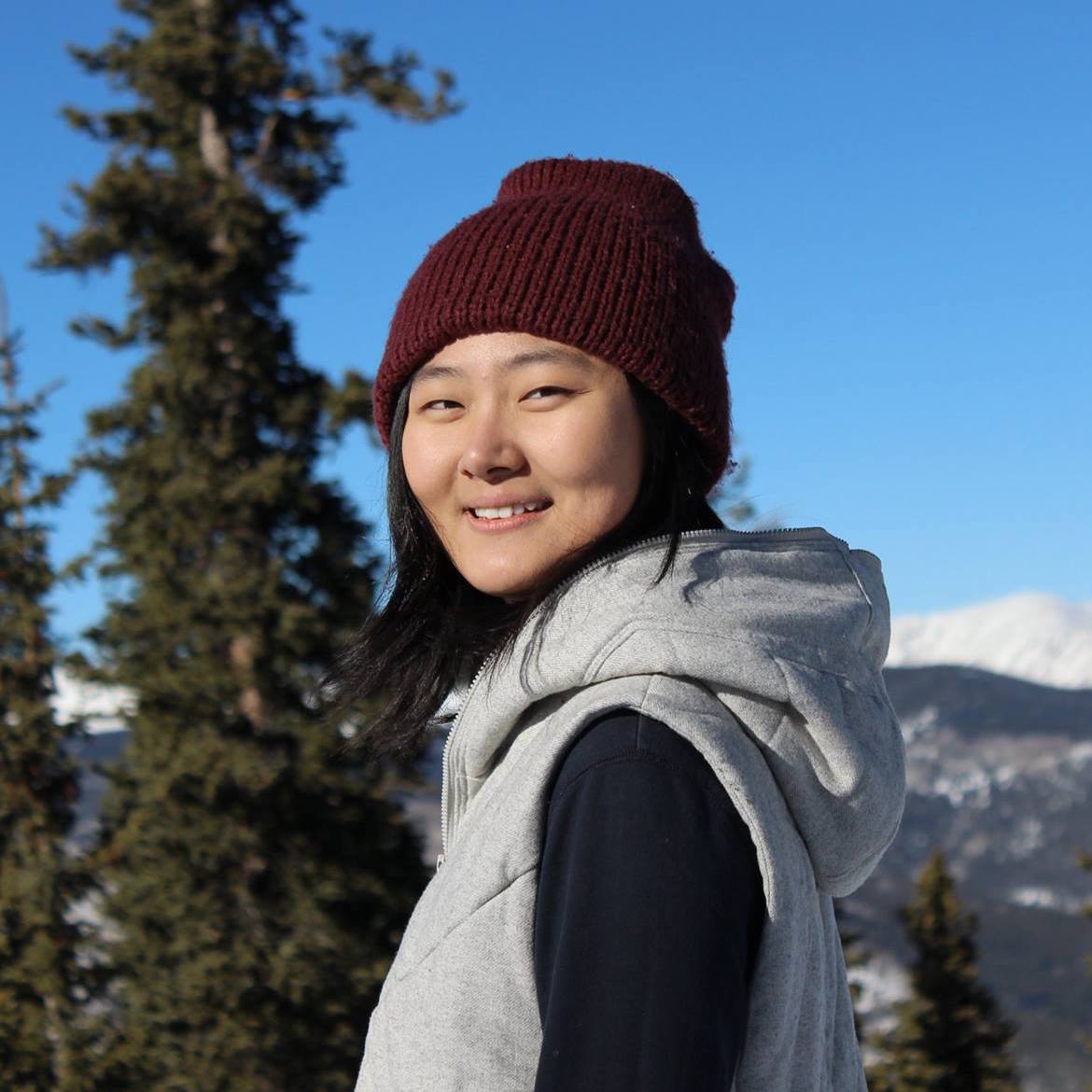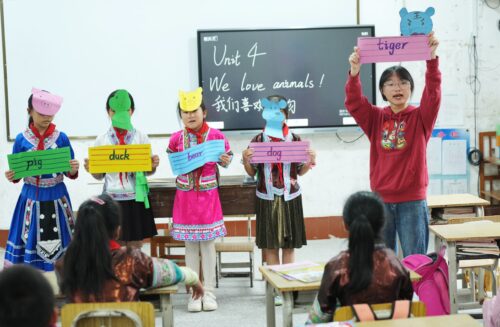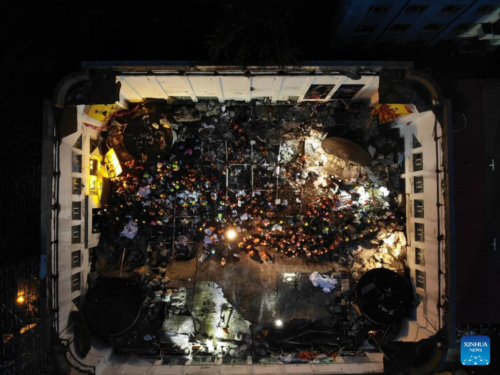Double alienation: A Chinese student in polarized America
Through radically different experiences — first in Grayson, Louisiana, and then at the liberal arts college Oberlin in Ohio — Xiaoqian Zhu has had a close and personal look at the ways America is divided. "In the end," she writes, "both places made me feel that I simply cannot fit in." And yet, she has not given up trying, spurred on by the promise that we can be better.

The world seemed to slow down when the coronavirus hit China. I was in my hometown of Zhuhai, searching for masks, trying to decide whether to go back to the U.S. for my senior year of college. I decided to do it. But not long after I reached American soil, the situation changed: The U.S. became the worst affected country. Schools, institutions, and businesses began to shut down one after another. Classes became online discussions. We began gathering at people’s homes to cook. The situation gave me time to reflect on my journey. I remembered how everything had begun with a poem in my middle school textbook in China:
I shall be telling this with a sigh
Somewhere ages and ages hence:
Two roads diverged in a wood, and I—
I took the one less traveled by,
And that has made all the difference.
“The Road Not Taken,” by Robert Frost.

On a steamy August day in 2011, while my classmates were preparing to go back to heavy loads of schoolwork in preparation for the gaokao, China’s national college entrance exam, I was boarding a plane at Hong Kong International Airport, grasping a file folder with my passport, documents, exchange student guide, a map of San Francisco International Airport, and a few pages of introduction to my final destination: Grayson, Louisiana. I knew Louisiana would be different from the America I saw on TV — skyscrapers, bridges, busy streets with burger joints and dim bars. “Louisiana is one of the poorest states in the U.S.,” I read. What would that look like? I thought to myself. Surely still better than the poorest parts of China? Words from President Barack Obama’s 2008 victory speech in Chicago, which I learned on my Casio electronic dictionary as English practice, began to ring in my memory: “If there is anyone out there who still doubts that America is a place where all things are possible, who still wonders if the dream of our founders is alive in our time, who still questions the power of our democracy, tonight is your answer.”
I landed in America as part of a high school exchange program. Before that, I was studying at one of the most selective public high schools in Guangzhou. I cried on the phone to my mother for feeling dumb in math and physics, and felt small while my classmates were running Student Union, winning national academic awards, traveling globally and performing on world-class stages. I wanted to keep up with my peers, and that included studying abroad — roughly 150 to 200 out of the 1,000 students in my class ended up getting a Western college education. I thought that by going to America, I’d shake off all these pressures and be appreciated for my personality, finally be free and happy. Obama’s words, in this context, felt magical, and true. Where all things are possible.

For the first three months in Louisiana, I struggled to fully understand the southern accent. But that did not stop me from doing many things for the first time: I read a corny love novel, attended a dance party, taught my classmates Chinese history, performed a monologue in drama club — things I could not do in China due to the intense focus on studying. But there were also many nights when, looking through an American history textbook, I was mesmerized by what America was about — the grand vision of the federalists, a people’s past reflected in the birth and amendments of the country’s constitution, a kind of moral progress in this nation built upon the three-fifths compromise, the expansionary wars and development under Manifest Destiny, the idea that American values are exceptional, the passionate calls for racial justice and peace in the ’60s, and the “one and only” American dream sold to immigrants from around the world, inspired by rags-to-riches stories, and the people like me — internationals drawn to the possibilities of personal success. Talking to Americans was just as eye-opening, in its own way. My rich, spoiled, white host sister rolled her eyes at the friends I made: poor white girls who liked coloring and math, a daughter of two lesbians, Pentecostals who kept their bodies covered, a Black teen mom, and other Asian exchange students.
As the only Chinese girl in town, I thought “exotic” was good. It was rare, after all. I even prepared myself for loads of eccentric questions. But at some point, they stopped being just eccentric. “Does China have internet?” people asked. “How do you write characters like that? They are like pictures! Can you write my name in Chinese?” I was 16 and had been in a foreign country for just three months, so I didn’t know how to respond except with earnesty: Yes, China has internet. Of course, hand me a paper and pen.
It got worse when my host sister started calling me “Chi” and laughed boisterously at me for looking “Chinese” during a Chinese circus show on a holiday trip to Nashville. “Is that your brother, Chi?” she burst into laughter. It was the first time I felt being “different” meant “inferior” to some people. Nothing had prepared me for this — not High School Musical, Friends, Titanic, or any of the other exposures to “America” I had received. Not even my friends back home who had warned me about “racism” could have known this is what it was like.
It took me many nights of tears to swallow my fear and finally be brave enough to say, “I can’t do this anymore.” When I transferred to another host family — a young white Baptist couple fond of the Southern conservative lifestyle — and a private Christian school, things got a little bit better. But while she treated me politely, my second host mom still considered it “rude” of me to not attend church with them on Sunday mornings, despite my explicit disavowal of Christianity. Later I realized that they took me in to “educate” me about God. My difference made my classmates, teachers, and host family all the more eager to spread the Gospel — the “good news” — to save me from “ignorance.”
Secretly, I wished my anxiety could be relieved by believing in Jesus. But I knew what lay ahead: a brutal competition back in China to get into American colleges, which is something religion could not help me with. A white friend didn’t understand why I had to get into some so-called “elite” and expensive college in the U.S. rather than just attend the local University of Louisiana. I wanted to explain what education meant to a Chinese family like mine, how “certain” my mother was that an American education would give me a much more promising future, as her friends send their children to Britain and America for college because it’s trendy for Chinese middle-class families to do so, and how much pressure I was under to succeed not just for myself but for all those around me. But instead I said, “I just have to.”

Naturally, my college search became a search for the very opposite of Louisiana. I looked for a crowd that would value diversity and champion tolerance, inclusivity, and love, as well as empathy for the “different.” In that spirit, I was drawn to an online post about an elite liberal arts college in the heart of Ohio.
Oberlin began to look more and more attractive as my curiosity about the “other side” of America grew. It seemed like — indeed, marketed itself as — a sanctuary for marginalized, left-leaning intellectuals. It seemed like I would be surrounded by educated people from metropolitan areas who would have had interactions with Chinese people and also some knowledge about my culture. I wouldn’t feel unsafe because minorities like me, a Chinese international student, would be heard and seen. Being different would not only be accepted but celebrated.
For anyone who has idealized a romantic relationship only to have their hearts broken later, you’ll understand how my Oberlin experience went.
Soon after arriving on campus, I realized I had entered a cauldron of political action. Quickly, I picked up the vernacular deployed in discussions and protests: POC, institutional, status quo, colonialism. The activism moved me with its passion. It is something that Chinese society would never allow. Growing up being the “good” student, I naturally was attracted to the rebellious nature of activism in its various forms — writing, protesting, slam poetry, visual arts, you name it. Politics changed the way I think about my relationships with others and the society I live in. I became a politics major and a writer for the Oberlin Review, through which I could learn about people of different communities.
Yet it also didn’t take long for me to sense that something wasn’t entirely right. Oberlin’s student body is 64% white, has a median family income of $178,000, and is predominantly liberal. While often openly siding with people of color, some white students told me they felt silenced as the POC community grew more radical and often shut down conversations with the phrase, “It is not my responsibility to educate you.” People were afraid to speak their minds and confined themselves to talking about their own experiences in public discussions. In my Intro to the Black Experience class, few white students participated in the discussion because it seemed to be intruding on others’ “safe space.” I was the only Asian student and I also didn’t raise my hand to speak. Not even once. In a way, I did learn about other people’s experiences by being a humble listener. Yet I didn’t feel like we learned how to be friends, or even talk to one another.
If I had been brave enough to be honest, I would have said I didn’t appreciate all the self-righteous noise. I didn’t appreciate the arrogance of, “It’s not my responsibility to educate you,” and the rhetoric, the labels, which my liberal-minded peers fell back on. As an international student, I was not aware of the racial dynamics in the U.S. at the beginning of my college experience, and that is precisely why I wanted to learn. If you don’t tell me what the issues are, I will never know. And the truth is, I want to know.
In contrast to conservatives who believe immigrants are in the U.S. to steal jobs or be spies, the liberal students at Oberlin seemed to have their own issues with Chinese students. We were seen as a wealthy and privileged crowd, the “new whites.” Indeed, most Chinese students at Oberlin pay full tuition and often come from affluent cities in China. I should say that this perception of us isn’t limited to my school: Chinese students everywhere are seen as “cash cows” or “walking ATMs” that “fix” a school’s financial situation (Chinese students contributed about $13 billion to the U.S. economy in 2017-2018).
Oberlin has a campus culture where friendship stems from allyship, so it’s no surprise that Chinese students often hang out with other Chinese students, or at least those who share similar political views. There was very little the school did to actually promote diversity or cross-cultural understanding. (For example, cultural organizations like the International Student Organization limit themselves to shallow social activities like ice-cream socials or game nights. Cultural diversity curriculum requirements do not recognize that international students are already stepping out of their comfort zones by studying on an American campus and taking U.S.-centric courses.) And it wasn’t that I didn’t have opinions; I simply tried to keep them within my Chinese-speaking community or close friends, lest I be accused of brainwashed.
When tension between the U.S. and China started to grow because of Donald Trump’s trade war and cybersecurity concerns, more negative rhetoric about Chinese students, pushed by American mainstream media, began flooding college campuses. Chinese students were labeled in international newspapers like the New York Times as academically unqualified “cheaters,” “communists” unassimilable into liberal democracy, and “intelligence thieves” with ulterior motives. An East Asian Studies professor and adviser to the Oberlin Chinese Student Association suggested that Chinese students “break up” the “gangs” to avoid unnecessary and sometimes “subconscious” hostility from our American peers, students, and professors alike. Being a politics major, I was already hypersensitive to the political atmosphere on campus. I couldn’t figure out why my very own existence at Oberlin had to be challenged this way, as if I didn’t belong. It brought me down on many days.

Freshman year, my mental health started to deteriorate due to academic pressure and the emotional distress of an unhealthy relationship. That relationship lasted into my junior year. When I finally got out of it, I was drained. My coping mechanisms completely crashed when I failed an economics course the second semester of my sophomore year, and yet I kept going and registered for three politics courses the first semester of my junior year, thinking that by avoiding economics I could still succeed in my chosen field.
My health went into a downward spiral. It was dangerously optimistic of me to think that medication could fix everything. I thought, naively, that I could go on taking challenging courses, until finally I lost all energy to keep up with schoolwork and struggled every day to go to class. Lying in bed, unable to sleep, counting the seconds, was my loneliest moment at Oberlin. I remember feeling so helpless that I reached out everywhere to friends and professors just to talk nonsense. Eventually, I was hospitalized and my father flew in from China to accompany me home.
What awaited were questions, confusion, doubts, and disappointment from my parents, relatives, and even friends. Why had I “become” ill? A psychology textbook will tell you it was a combination of genetic and environmental factors. No one in my family had ever been diagnosed, though my mother and her side of the family tend to be ill-tempered. My parents leaned into the environmental factors after I tried to explain what happened to me. “You are too engaged with other people’s business,” they said. “You lacked boundaries.” “You are not fit for politics and you shouldn’t study it, it’s too controversial and you cannot handle it.” “You should not have gone to America, their epidemic of mental illness made you sick.” “You are not able to manage your emotions.”
The worst and most hurtful comment I received was from my aunt: “You are ill because you are too spoiled.” I didn’t know what that meant. Is it that in my aunt’s eyes, getting everything I wanted, Oberlin and a major in politics, was too expensive and unrealistic for my parents to bear? She never said. My father called my mental illness a “rich person’s disease,” and claimed that no one could save me, not doctors, therapists, friends, or God, if I myself didn’t have the will to “power through.” I felt deep frustration from my mother, who had always advocated for me to study abroad, as she began to murmur, “If I had known you were ill, I’d never have let you go overseas.”

How do you expect the native to empathize with the alien when they’ve never set foot outside their country? In conservative Louisiana, people saw me as a strange Asian girl who was far more interested in getting an A+ in American history than in knowing how to chill and drink at a party. They asked me unbearably elementary questions about China and my ethnicity. I was made to feel that being Chinese was out of place, foreign. Yet at Oberlin, a liberal paradise, I was expected, as an international student, to know everything about both national and local political and racial discourse. No one wanted to slow down and explain anything to me. No one seemed to prioritize conversation over polemic. In the end, both places made me feel that I simply cannot fit in in America.
And after all that, I returned home to another kind of alienation from my own family, my own people.
My determination to complete my college degree has led me back to Oberlin. In the midst of it all, coronavirus and the forthcoming presidential election, I feel the obligation to protect myself physically and mentally. One of my tricks is to lower my expectations for the future, whether about what I can do with my liberal arts degree or what job I can get during a pandemic. I also expect less from politics; however thrilling it may seem, it is not the only way to change the world.
Acceptance, empathy, understanding, respect, love…These are the things I crave, not just on a personal level, but for others in the environment I live in. I am aware that these things don’t come easily. Collectively, as humans, we have to learn to practice them together, across differences. It is unknown, scary sometimes. But I am not giving in. Maybe others will follow, in time.







